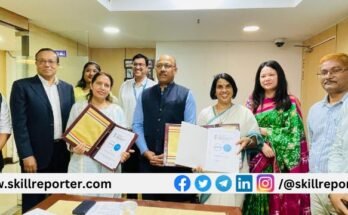Introduction
The textile and apparel industry is one of the earliest industries developed in India. Its entire value chain from fiber to apparel manufacturing has a strong presence within the country. It is the biggest employer after agriculture. In order to meet the skill gap in the industry and also to supplement the efforts of the industry in employment generation, Government of India h a s approved the new scheme titled “Scheme for Capacity Building in Textiles Sector” for the entire value chain of textiles except Spinning and Weaving in the organized sector. The scheme was initially launched in 2017-18. Further Scheme is extended till March 2026 i.e., 2024-25 to 2025-2026 co-terminus with 15th Finance Commission to train 3 lakh persons.
Objectives
- Demand driven placement-oriented skilling programme to incentivize the efforts of the industry in creating jobs in textile and related sectors, which includes skilling, re-skilling, skill up-gradation, multi-skilling in various job roles for entire value chain of mainstream sectors except spinning & weaving.
- To promote skilling and skill up-gradation in the decentralized traditional sectors such as handlooms, handicrafts, jute, silk etc. through respective enhancement of wages of weavers, artisans, and craftsman. To promote skilling and skill upgradation in the traditional sectors of handlooms, handicrafts, sericulture and jute.
Terms and Conditions
- The Ministry through this RFP intends to empanel organizations working in textile value chain / textile related item in India / Textile Industry Associations registered under Central/ State Government/Chambers of Commerce of Central/ State as Implementing Partners (IPs) to undertake training programmes across the entire value chain of organized textiles sectors except Spinning & Weaving on the terms and conditions as stipulated in the scheme guidelines which have been issued on 23rd April, 2018.
- The empanelment of Implementing Partners will be based on the following parameters:
- Organization credentials
- Financial strength
- Empanelment of the agencies will be provisional and target for training under the scheme will be awarded to the agency subject to the availability of the training target, budget and training capacity as laid down by the Ministry from time to time.
- Trainees under the scheme will be selected through a transparent and inclusive process. The trainee must be a citizen of India possessing an Aadhaar Card (unless exempted under Aadhaar Act, 2016) with age over 14 years. Preference will be given to the marginalized social groups like women, SC/ST, differently-abled persons, minorities and persons from the BPL category.
- A minimum of 80% attendance during training is mandatory for a trainee to be eligible for assessment. Aadhaar Enabled Biometric Attendance System integrated with centralized MIS will be adopted to ensure real time attendance of the trainers and the trainees.
- Infrastructure for conduct of Training: The IP must possess the requisite training infrastructure as laid down in the Training Centre (TC) infrastructure protocol downloadable form the Samarth website (https://samarth-textiles.gov.in).
- Trainer: Each of the training centre will be run by a qualified trainer and support staff. The capacity of the trainers shall be enhanced through a comprehensive Training of Trainers (ToT) Programme. Training of Trainers will be conducted by the Resource Support Agency (RSA) of Samarth and Sector Skill Councils in line with the common norms and guidelines of Ministry of Skill Development & Entrepreneurship (MSDE).
- Course Content: Only the courses which are aligned with NSQF and approved by the RSA will be offered to the trainees. The content for each course/programme shall be need-based to meet the highest standards and requirements of the related industry segment, including awareness about labour laws, and will be designed by the RSA in consultation with the industry. Use of multimedia content and other applications of Information Technology (IT) would be encouraged.
- Mandatory CCTV recording has to be done for the entire training programme. Recordings have to be kept by Implementing Partners (IP) for a minimum period of one year from the date of completion of training programme.
- Assessment and Certification: Third Party Assessment and Certification will be mandatory for all the eligible trainees. The RSA will specify the assessment protocol and procedure in line with the Common Norms of the MSDE. Assessment Agencies will be required to ensure video recording of the entire assessment process and record to be kept for one year from date of assessment.
- Placement: The IP shall provide placement to 70% of successfully certified trainees, trained in organized sector under the scheme in wage employment.
- Placement Retention: The IP shall provide 6 months of placement retention to each placed trainee.
- Post Placement Tracking: Each trainee will be tracked by the IP for a period of one year from the date of certification of training. The IP will be required to upload the details of placement and tracking on MIS every month along with the supporting documentary proof.
- Funding: The assistance under the scheme will be only towards the cost heads (refer para 7.4.1. of the scheme guidelines) covered under the Common Norms of the MSDE and agreed to by the Ministry under this scheme. Funds will be provided as per the scheme guidelines and amendments done from time-to-time. Detailed costing of training programme under “Samarth” may be referred to at Annexure-III of the scheme guidelines.
- Where any implementing partner is already obtaining assistance from GOI or State Government under any other scheme for any cost component or where Government infrastructure is involved in the training, appropriate deduction from GOI share shall be made as per the cost norms notified by MSDE from time to time.
- Sub-contracting / sub-letting of the training programme is strictly prohibited.
- In the case of Textile Industry unit, allocation of training target is for meeting the requirement of skilled manpower in respective organizations.
- In the case of Industry Associations, allocation of training target is for meeting the requirement of skilled manpower of its Member / Partners.
- Textile Industry can either submit application directly for empanelment or can participate in the training programme under the banner of Industry Association / Chamber of Commerce etc., subject to fulfilling eligibility criteria as per the para 4 of the RFP.
- The empanelment of agencies will be valid till March, 2026.
- For more details in respect of any point, please refer to the scheme guidelines issued on 23rd April, 2018 (available at www.texmin.nic.in/ Samarth website (https://samarth-textiles.gov.in).
Last Date For Submission: 31 March 2025, 06:00 PM IST




